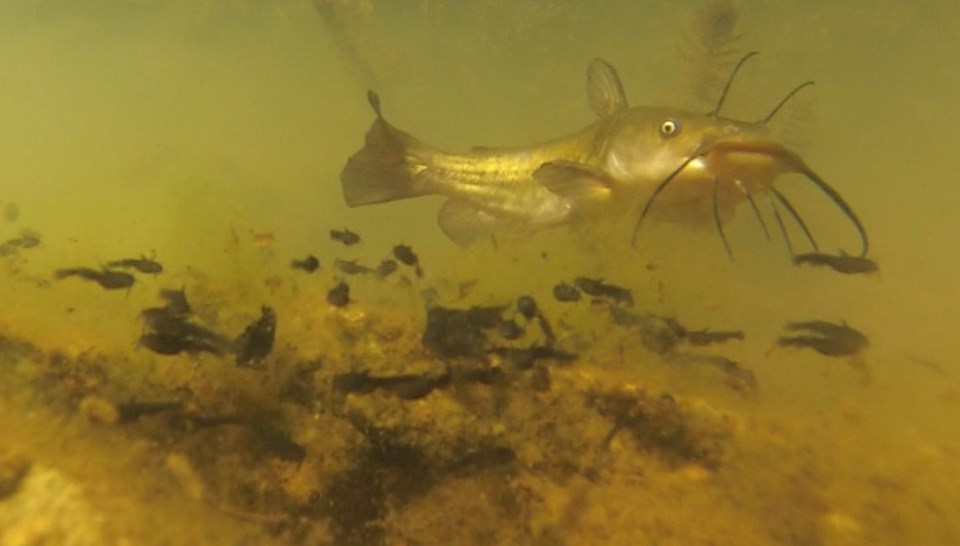Squamish's John Buchanan has spent a lot of time above and below the surface of local lakes, but what he saw Sunday, came as a shock.
He came upon a brown bullhead catfish on the shore of Brohm Lake, then used his underwater camera to capture images of them swimming at the popular swim spot.
This fish is an invasive species, not native to the lake.
Instead, bullheads are native to regions of eastern North America.
Buchanan described the sighting as "crazy."
"I am walking along the shoreline and see this really big fish, close to the shoreline... it wasn't moving. It was stationary," Buchanan recalled. "I thought 'Oh, my God. It is a catfish, guarding its young.'"
The male bullhead tends to the juveniles.
Clare Greenberg, executive director of Sea to Sky Invasive Species Council told The Chief her organization has records of brown bullheads in Brohm going back to the early 2000s.
It matters that such invasive species are present in local lakes because they compete with other species through predation and competition.
"They are opportunistic bottom feeders and when they feed they muddy up the water and that impacts other visual predators — so other fish that are predators have a tough time being able to spot their prey and they become less efficient hunters."
Brown bullheads can carry the contagious bacterial disease haemorrhagic septicaemia, which can cause death in various finfish species, according to an invasive species bulletin by the provincial government.
This disease has caused large die-offs of native fish species in the Great Lakes.
Compared to native species of fish, the brown bullheads thrive well in marginal, or polluted waters with low oxygen and over winter, so they out-compete native fish, Greenberg said.
The fish are also known to be in Brohm River and Birkenhead River, north of Whistler. Sightings have also been recorded in ditches and canals in Pemberton, Greenberg said.
"They are found in the live food and aquarium trade," she said. "They likely arrived as contaminants in shipments of other game fish released in provincial waters — sort of accidentally released. But another way invasive fish can enter river systems is through people releasing unwanted pets and aquarium fish."
Brown bullhead catfish are more common in the Lower Mainland waterways than in the Sea to Sky Corridor, Greenberg said.
There is no plan to combat the invasive species in local waters, according to Greenberg.
"We don't have any funding, really, to do any control of invasive animals, region-wide. There's a big lack of funding for that," she said. "We don't even have good maps to know where these species are."
One of the projects the Sea to Sky Invasive Species Council is currently working on is compiling all the different data that exists to then tease out the invasive animal data to create consolidated maps of where the various invasive species have been spotted. "We are still at that stage," she said.
"We are recording observations and adding them to our database and then we can look into what we do about them all."
Buchanan said he also saw pumpkinseed sunfish, another invasive species in Brohm Lake.
Greenberg said the sunfish is also at Edith and Stump lakes.
Goldfish are a problem in Pinecrest Lake, Jordan Creek and Alta Lake in Whistler.
"All of these fish are doing really well. They are really good at breeding. They reproduce quickly and they seem to thrive in lots of different conditions."
The goldfish were likely abandoned pets, she said, adding that it is important to not release unwanted pets in the wild.
If you spot a fish that doesn't seem native to the area, contact the Sea to Sky Invasive Species Council at ssisc.ca/report/.
**Please note, this story has been corrected since it was first posted to say the bullheads are found in Birkenhead River, north of Whistler. The story originally wrongly said Birkenhead Lake.



